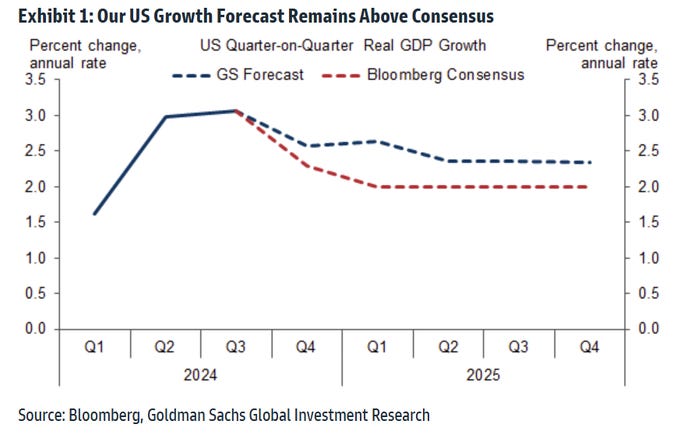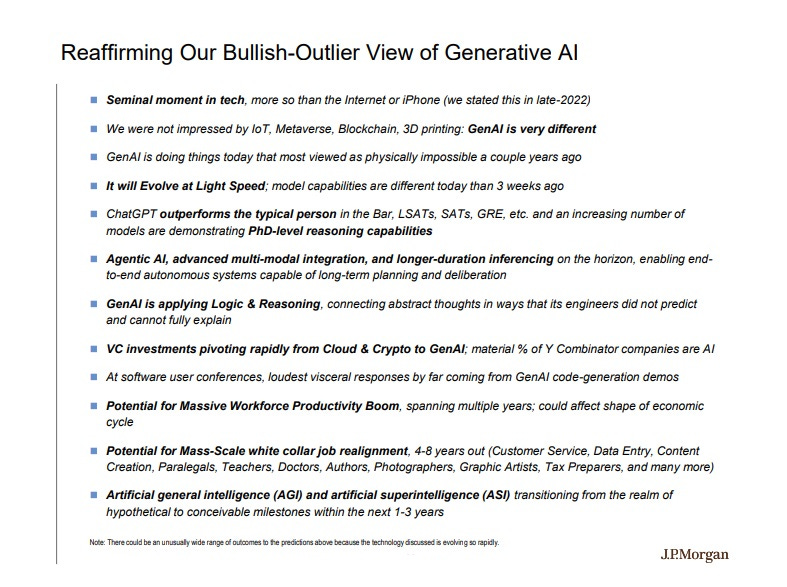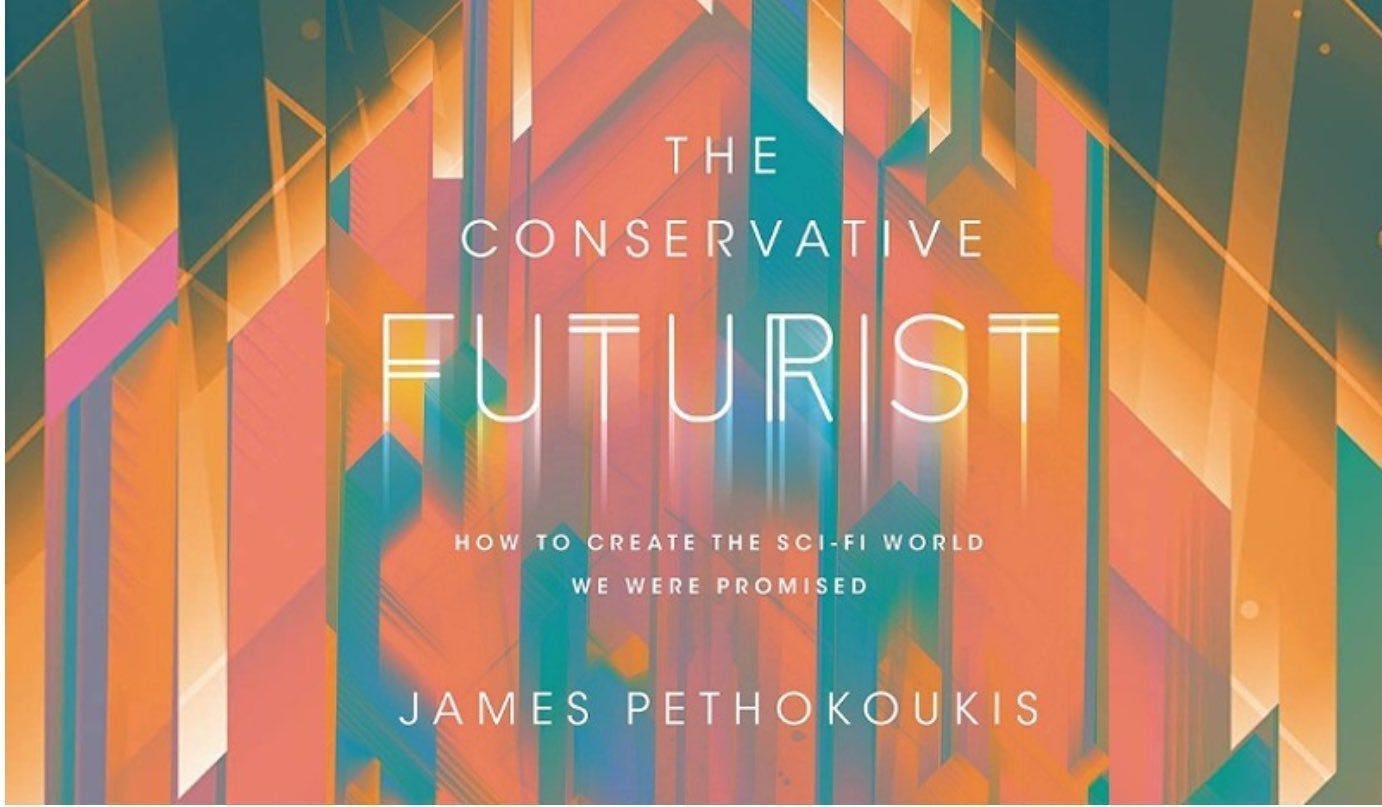🌅 A (new) American Golden Age
Trump is right. A range of technology breakthroughs, backed by trillion-dollar investments, could spark a transformative era — if we make the right policy choices to fully unlock their potential
Donald Trump began his second presidential inaugural address by declaring “the golden age of America begins right now” and finished by saying, “The future’s ours. And our golden age has just begun.”
Now, no surprise to my loyal readers, that sort of lofty language is inherently appealing to me, someone who has been writing about the possibility of a “New Roaring Twenties.” Look, you’ve utterly misinterpreted this newsletter if you think I’m repulsed by any American president saying that “we will pursue our manifest destiny into the stars, launching American astronauts to plant the stars and stripes on the planet Mars.”
The stars, our destination! (Thanks to American companies SpaceX and Blue Origin.)
All that said, I understand if some of you find such speechifying to be cringey, especially coming from Trump, a politician known for over-the-top puffery and wildly grandiose statements. Moreover, the American economy is already pretty shiny, if you must know, with a new Goldman Sachs research report saying it’s in “the sweet spot of healthy growth and gradual disinflation,” and the IMF predicting another year of outperformance versus other rich countries.
Yet even amid that plethora of positivity, the risk to growth from Trumponomics — especially regarding immigration, trade, and overall policy uncertainty — shouldn’t be dismissed. Not at all.
The converging forces of a new era
Let's take a step back and consider the Golden Age idea. It’s not crazy. Multiple powerful tailwinds are converging that could make such a bold proclamation more than mere rhetoric that starts to seem stale a week or two from now.
The most obvious is artificial intelligence. Leading technology companies, as well as prediction markets, are signaling that artificial general intelligence — systems with human-level reasoning capabilities across domains — could emerge within a few years. But set AGI aside. Even generative AI that falls short of that still science-fictional level could greatly increase worker productivity growth, potentially doubling or tripling the baseline economic growth rate predicted by the Federal Reserve and Congressional Budget Office. (For context, that would match or exceed the remarkable productivity boom of the late 1990s.)
I mean, it’s hard not to be enthusiastic when you hear that OpenAI CEO Sam Altman has scheduled a closed-door briefing for US government officials in Washington, according to Axios, perhaps to brief them on “Ph.D.-level super-agents to do complex human tasks.” Accelerating science and technology is the economic endgame here.
Crucially, we're not just seeing hand-wavy speculation of theoretical potential or CEOs talking their own books. Major companies are already making massive investments in AI infrastructure. In the first half of 2024, tech giants increased their capital spending by 50 percent to build out their AI capabilities. Industry analysts project up to $1 trillion could be invested in AI-related infrastructure within five years. This represents a massive bet on AI's transformative power that even hard-core skeptics shouldn’t ignore.
America's unique position to lead
A nuclear revival is adding another potent tailwind. It’s not just reactor restarts, such as the one that may happen at Three Mile Island. Companies like Helion Energy are making breakthrough advances in fusion technology, while new fission reactor designs promise safer, cheaper clean energy. This comes as permitting reform efforts could (maybe, hopefully) dramatically accelerate deployment of all forms of energy infrastructure. The ability to build abundant clean power quickly will be crucial for powering AI data centers and an overall expanding economy. Indeed, the mere recognition among both Democrats and Republicans that America needs abundant energy and that nuclear should be a key part of it is a tailwind in and of itself.
What's more, America enters this technological revolution with unique advantages. We have the world's deepest capital markets, most innovative companies, and strongest research institutions. Of the world's 20 largest technology companies, 15 are American. US-based institutions produced nearly multiples more top AI models than Europe and China. Our entrepreneurial culture and ability to attract global talent remain powerful assets.
A Golden Age needs to be fiscally sound and sustainable. A technological acceleration could help address major challenges, including America's long-term fiscal outlook. The CBO projects federal debt reaching 166 percent of GDP by 2054 under current policies. But their analysis shows that just a 0.5 percentage point increase in productivity growth would reduce that figure to 124 percent. More optimistic AI-driven productivity scenarios could potentially stabilize or even reduce the debt burden while raising living standards for all Americans. I call that win-win.
Beyond American exceptionalism
Dealing with debt is the least of it, really. The core opportunity at hand is about the potential to cure diseases, revolutionize education, solve our energy challenges, and create opportunities for billions of our fellow humans to lead richer, more fulfilling lives. And America, with its unique combination of technological leadership, institutional strength, and entrepreneurial dynamism, is uniquely positioned to lead this transformation.
None of this is guaranteed, of course. Realizing our potential will require thoughtful policy choices around regulation and permitting, science investment, taxation, infrastructure, and immigration. (Did I mention regulation and permitting?) We have to keep the momentum going.
This is important: The big vision, at least for me, here isn’t just about a Golden Age for America. Consider the journey of civilization: from small bands of hunter-gatherers using simple tools to today's interconnected global society. Each major advance in our ability to harness energy and process information has enabled extraordinary leaps in human flourishing. We now stand at the cusp of perhaps the greatest such advance since the Industrial Revolution. It’s not just an American thing. It’s a human thing.
So while healthy skepticism of political rhetoric is always warranted across the political spectrum, we shouldn't let it blind us to genuine possibilities for transformative progress. The ingredients for a new Golden Age — revolutionary technology in AI/energy/space/biotech, massive investment, and America's enduring advantages — are real. Whether we fully realize that potential will depend largely on our choices in 2025 and beyond.
Let me end with this passage that ends the first chapter of my 2023 book:
America can again become an Up Wing country. The opportunity is at hand. We’re experiencing the biggest wave of emerging technologies—in computer science (AI/ML), biology (CRISPR genetic editing), energy (advanced nuclear fission/fusion and geothermal), and space (reusable rockets)—in decades. And many of our greatest challenges—fully recovering from a pandemic, mitigating the worst impacts of climate change, outcompeting a new geopolitical rival, eliminating extreme global poverty, ensuring humanity’s survival against threats biological and astronomical—present an opportunity for Up Wingers currently stuck in both of today’s predominantly Down Wing parties to present a vision of the future that can inspire the American people and their leaders to make it happen. Conservative futurism, in particular, recognizes that humans aren’t merely passive victims of nature or fate, but active agents who can shape their own destiny and improve their condition through creative and entrepreneurial problem-solving. So let’s go! The future America we used to dream about is waiting. Faster, please!
On sale everywhere The Conservative Futurist: How To Create the Sci-Fi World We Were Promised






Toward the end of your fountain of enthusiasm you wrote, "The ingredients for a new Golden Age — revolutionary technology in AI/energy/space/biotech, massive investment, and America's enduring advantages — are real."
I'm not about to argue with that. You must acknowledge, though, that those ingredients were in place before the recent election. Trump had nothing to do with bringing them about. They developed mainly during the Biden administration.
The important question is whether Trump, with his pettiness and divisiveness, will impede the use of these resources. So far, it's not looking good. If, as he suggests, Trump sees the last four years as an American dark age, his mind must be so beclouded by narcissism and hate that he does not have the clarity of mind these times require. (An example of an unclear mind is Trump's order shutting down communication between HHS scientists (including NIH scientists) and scientists outside the government.)
Worse, those of us who want to move forward will feel forced to spend much of our time defending ourselves against the possibility of his wrath rather than devoting our talent and energy to bringing what has been developed so far to further fruition.
Like you, I hope for the best for our country. Unlike you, I'm much less optimistic that our recent shift toward vindictiveness and name-calling is moving us in the best direction.
India is already wetting their lips on all the immigrant tech minds returning home
Boost their tech industry.
Funny the rest of the world is praying they will be the next tech hub and trumps america is giving them the goods on a sliver platter.
Funny BRICS is struggling to create an alternative currency and trump wants to help them along the way.